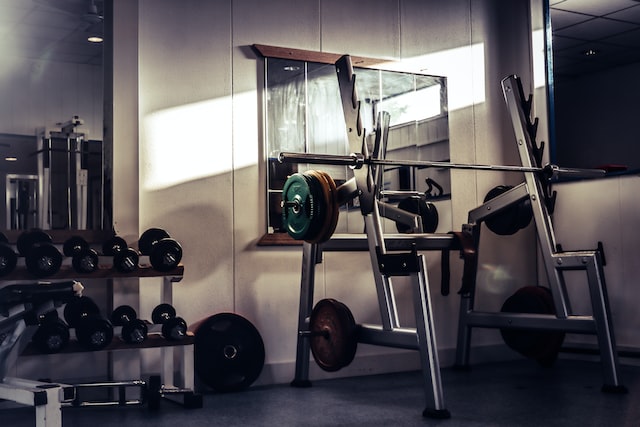Assuming you have no physical restrictions, you absolutely must perform the squat or dead lift if you want to pack on the maximum amount of muscle in the shortest time.
That said, the squat can be a dangerous exercise to do if you don’t know how to perform it the right way. Here’s 10 top tips to help you;
- Make certain you have a good safety setup
When you squat you must either do the movement inside a power rack, or you need two or better still 3 spotters. (One either side and one behind you – and they need to know what to do and when to do it.)
It’s vital you have some way of safely racking the bar if you fail on a rep. If you use the power rack, which is the best option as you can train alone, set the pins about 2 inches below the bottom position of the squat, so you can rack the bar if you can’t come out of the hole.
- Never squat with your heels elevated
This is really bad for the knees. If your ankles aren’t flexible enough for you to squat with your feet flat on the floor, work on your flexibility. - Sit back as you go down
Most people lean too far forward as they squat down. Keep your back straight and stick your butt out to squat down correctly. This will feel a bit odd at first, so practise it without any weight and then use the technique with light weights until you get used to the feel of it.
At first it will feel as though you’re going to fall backwards, but stay with it. Squatting this way is much safer for your knees and back, and helps you to keep the weight of the bar off the front of the foot. If you can visualise it, imagine that you’re squatting between your knees.
- Make sure that your knees don’t travel too far forward as you go down.
Sitting back as you descend will help you here. The reason is to keep stress off the knees.
Ideally you don’t want your knees to track forward of your feet. Depending on how flexible you are this may not be possible, but try and keep forward travel of the knees to a minimum. - Keep your weight mostly through your heels.
You should feel able to wiggle your toes – don’t do that, but the point is that if your weight is on the front of the foot, you wouldn’t be able to wiggle them. Again, this is better for the knees. - Don’t wear knee wraps
Wraps hold the knee joint in an unnatural position. I made my own knees much worse by wearing wraps, and as soon as I stopped using them, my knees got much better. Contrary to popular belief, squatting is not bad for the knees if done properly – in fact it’s good for them! - Keep your back flat
An absolute must – If you allow your back to round, you’re setting yourself up for a serious injury. - Lead with your head as you come up and focus your eyes on a spot on the wall opposite
This will help you to keep your back straight, and keep the stress of the weight evenly spread on the legs and back. - Position the bar on your trapezius muscle, not on the vertebrae at the top of your neck.
This means that the bar is a bit lower on your back than you may be used to, but it’s much safer for your back to have the bar balanced on a muscle rather than on your backbone.
This will also help your balance as you get used to sitting back as in point 3. If you do shrugs you can build muscle on your traps, which will cushion the weight of the bar. Shrugs also give you that freaky look at the back of the neck that a lot of bodybuilders crave!
- Increase the weight in small manageable increments.
If you added a measly 2 pounds to the bar each week, then you’d have added 100 pounds to your squat after a year. And I guarantee you will have radically changed your body in the process!
It’s important to keep your form textbook as you add weight to the bar.
To sum up, if you squat consistently and add weight to the bar in manageable increments while keeping your form tight, you can build your perfect body faster than you ever dreamed possible.
Squatting also will make your upper body muscles more responsive to weight training exercises, so do not neglect the squat. Make it or the dead lift the cornerstone of your weight training routine.

